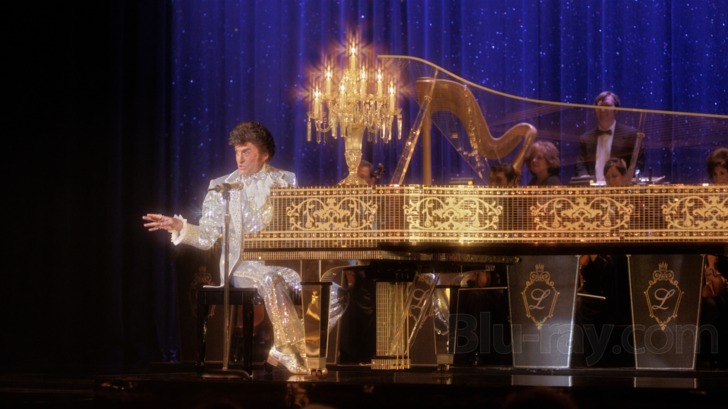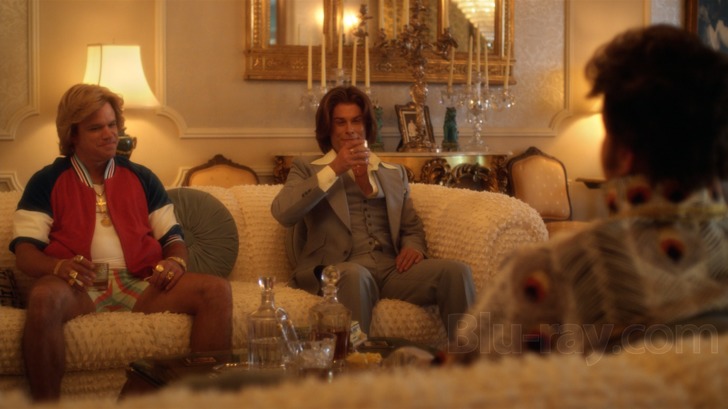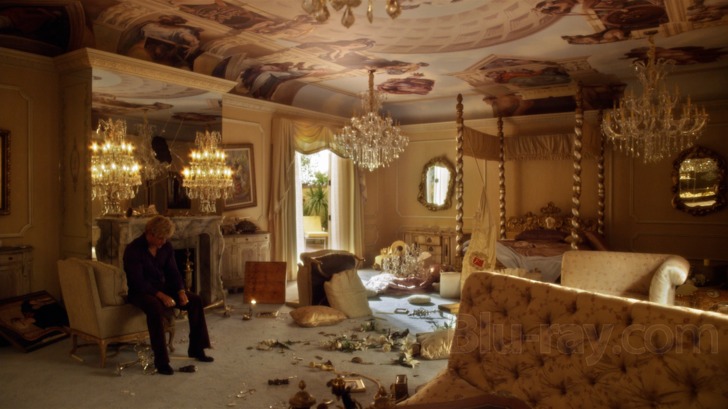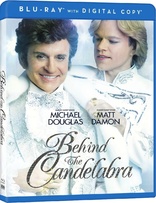Behind the Candelabra Blu-ray Movie
HomeBehind the Candelabra Blu-ray Movie 
Blu-ray + UV Digital CopyHBO | 2013 | 118 min | Rated TV-MA | Sep 17, 2013
Movie rating
7.2 | / 10 |
Blu-ray rating
| Users | 1.8 | |
| Reviewer | 4.0 | |
| Overall | 4.0 |
Overview
Behind the Candelabra (2013)
Based on the autobiographical novel, the tempestuous 6-year relationship between Liberace and his (much younger) lover, Scott Thorson, is recounted.
Starring: Michael Douglas, Matt Damon, Rob Lowe, Dan Aykroyd, Scott BakulaDirector: Steven Soderbergh
| Biography | Uncertain |
| Drama | Uncertain |
| Romance | Uncertain |
Specifications
Video
Video codec: MPEG-4 AVC
Video resolution: 1080p
Aspect ratio: 1.78:1
Original aspect ratio: 1.78:1
Audio
English: DTS-HD Master Audio 5.1 (48kHz, 24-bit)
Spanish: DTS 2.0
Subtitles
English SDH, French, Spanish
Discs
25GB Blu-ray Disc
Single disc (1 BD)
UV digital copy
Playback
Region A, B (C untested)
Review
Rating summary
| Movie | 4.0 | |
| Video | 4.5 | |
| Audio | 4.5 | |
| Extras | 1.5 | |
| Overall | 4.0 |
Behind the Candelabra Blu-ray Movie Review
Hall of Mirrors
Reviewed by Michael Reuben September 14, 2013Steven Soderbergh's HBO film, Behind the Candelabra, chronicles the closeted relationship between Scott Thorson and international entertainment legend Liberace, who was 40 years his senior. When the relationship ended after five years, Thorson sued Liberace for palimony, eventually accepting a nominal settlement. According to Thorson's memoir, which Richard LaGravenese adapted for the film, the two men reconciled shortly before Liberace's death in 1987 of AIDS-related causes. Thorson's perspective is both the film's strength and its limitation. By adopting Thorson's point of view, Soderbergh avoided the usual cliches of the bio-pic charting an entertainer's struggle, success and battle with personal demons. The film finds Liberace as Thorson discovered him: an established star, surrounded by handlers and well-wishers, insulated by wealth and achievement and, most importantly, wrapped in years of accumulated denial and public legend about his sexual identity. "It's funny that this crowd would like something this gay!" says Thorson upon first seeing Liberace's show in Vegas, after his conversation with a companion draws disapproving stares from the mainstream attendees at the next table. The amused companion replies: "Oh, they have no idea he's gay." Fueled by powerhouse performances and a lovingly detailed production design (with, apparently, the full support of the Liberace Foundation), Behind the Candelabra is a portrait of a uniquely gifted entertainer from the perspective of someone who was never once fooled by the public pretense—but that doesn't make it an "inside story". The man Thorson meets has been a superstar for years. No one attains that level of success without creating multiple masks to hide behind, and Liberace had more to hide than most. His preference for young, impressionable men (Thorson was sixteen when they met) can be seen not just as an aesthetic choice but as self-protective. Their lack of experience made youngsters like Thorson less inclined to question the great man's whims. Thorson may have drawn closer to the candelabra than most. Whether he truly got behind the scenes, or was able to comprehend what he saw there if he did, is a different matter.

In 1977, Scott Thorson (Matt Damon) is working as an animal trainer for the movies. He is introduced to Liberace (Michael Douglas) by Bob Black (Scott Bakula), a Hollywood producer he meets at a gay bar, when Black takes Scott backstage after Liberace's show in Vegas. The great entertainer's current "protégé", Billy Leatherwood (Cheyenne Jackson), can't conceal his hostility as Liberace flirts with the star-struck Scott. Billy has good cause. Soon enough, Billy is moving out of the headliner's ornate Vegas mansion, and Scott is moving in, as chauffeur, general assistant and, very quickly, bedmate. The film follows Scott and Liberace (known as "Lee" to his friends and "Walter" to his family) during the ups and downs of their five-year relationship, until their acrimonious breakup in 1982. Douglas' incarnation of Liberace is a remarkable achievement, both on stage and off, but his Liberace is always performing, even in his supposedly intimate moments with Scott. The older man offers the impressionable boy—a product of foster homes and state-run institutions—a golden present and the dazzling vision of a secure future, with prospects of adoption, inheritance and property of his own. But nothing is ever finalized in writing. While Lee plays the generous and tender benefactor, his hard-nosed business manager, Seymour Heller (Dan Ayckroyd in a nicely understated performance), keeps his eye on the bottom line. "Why don't you stay out of my fuckin' business", he tells Scott, after he tries to offer Liberace advice on concert dates. At some level, Scott senses that he's no more than a trophy wife (without even the benefit of legal status or a pre-nup). When Lee's long-time servant, Carlucci (Bruce Ramsay), tells Scott the hard truth, namely, that he's one in a long line of Liberace's sexual companions, Scott has the man fired, but he can't forget the specter of Billy Leatherwood. His fears fuel a growing drug habit fed by Dr. Jack Startz, the plastic surgeon to whom Lee turns for a complete makeover when he sees himself on The Tonight Show and is shocked at his wrinkled face. In a supreme act of narcissism, Lee insists that the much younger Scott also have facial work, with the goal of looking more like him. Under Startz's care, Scott becomes a pill popper and quickly graduates to cocaine supplied by Mr. Y (Nicky Katt). The combination only intensifies his paranoia. (In a humorous touch of stunt casting, Dr. Startz is played by Rob Lowe, whose still-youthful features become truly grotesque when taped into the frozen posture of someone who has turned himself into a walking advertisement for the "benefits" of plastic surgery.) There are moments in Behind the Candelabra when glimpses of another side to Liberace peek through the many layers of masks. After the death of his domineering mother (an almost unrecognizable Debbie Reynolds), Scott expects Lee to weep and mourn. Instead, once they are alone, Liberace stares intently for a moment before announcing: "I'm free." Then he plunges headlong into an adventurous promiscuity that Scott finds both shocking and frightening; it becomes a factor in their breakup. The film doesn't say so, but the suggestion hovers in the air that this new-found freedom indirectly led to Liberace's death from AIDS. To the very end, though, Scott remains in thrall to the magic of Liberace. At his funeral, Scott's imagination replaces the religious services with a Vegas show, where his former lover ascends to heaven on wires surrounded by fabulously costumed chorus girls under a halo of piano keys. Liberace was never entirely real to Scott Thorson in life, where they shared a bed. Why should death be any different?
Behind the Candelabra Blu-ray Movie, Video Quality 

As he has done on all his films since Traffic, Soderbergh acted as his own cinematographer under the pseudonym "Peter Andrews". Behind the Candelabra was photographed on the Red Epic camera and finished on a digital intermediate, from which this Blu-ray was presumably sourced. The image on HBO's 1080p, AVC-encoded Blu-ray is suffused with a golden glow whenever we are in Liberace's world (which is most of the movie) and otherwise uses cooler colors. Whatever the palette, detail is generally excellent, allowing the viewer to take in the exhaustive detail with which the film crew recreated Liberace's mansion, wardrobe and stage shows. Blacks are solid when they appear, colors are vivid (Liberace wouldn't have it any other way), and contrast is strong without being overstated. Despite the use of a BD-25, compression artifacts were not an issue; RED footage compresses well, which is partly due to the lack of film grain, which can pose a challenge for a compressionist.
Behind the Candelabra Blu-ray Movie, Audio Quality 

The 5.1 soundtrack for Behind the Candelabra was overseen by Soderbergh's long-time mixer and editor, Larry Blake, and is presented on Blu-ray in lossless DTS-HD MA 5.1. The musical score was the last work of the late Marvin Hamlisch, to whom the film is dedicated. Hamlisch, who was no stranger to either the movies or Las Vegas, has recreated the sound of Liberace's arrangements with finesse and expertise, and the Blu-ray's soundtrack puts you into the middle of them, complete with a sense of the star's amplified voice in the auditorium (although Douglas can't possibly match the real Liberace's talents as a singer). In many cases, recordings of Liberace's own piano performances have been woven into the mix; in other instances, another performer has recorded them anew. The track has wonderful fidelity and broad dynamic range, and if it had to be Hamlisch's last, it's a proud accomplishment. Non-musical sequences have clear, well-prioritized dialogue, well-placed effects and a nice sense of ambiance particular to each environment. An impromptu visit by Scott and Lee to a sleazy porn store with private video booths is especially well done.
Behind the Candelabra Blu-ray Movie, Special Features and Extras 

The sole supplement is The Making of Behind the Candelabra (1080i; 1.78:1; 14:03), a short but informative EPK with contributions from Douglas, Damon, LaGravenese and various individuals responsible for the production and costume design, who discuss the challenges of making the film as authentic as possible. Notably missing from the interview subjects is director Soderbergh. At startup the disc plays a promotional trailer for HBO Films, which can be skipped with the chapter forward button and is otherwise not available once the disc loads.
Behind the Candelabra Blu-ray Movie, Overall Score and Recommendation 

Throughout Behind the Candelabra, Liberace refers to his early days playing piano in "saloons". If the material exists to make one with authenticity, it would be interesting to see a bio-pic about those early days, exploring the drive of the young piano prodigy who decided to make his fortune as a popular entertainer and how he created the elaborate public persona that made him universally beloved when, from the standpoint of today, it was so obviously a drag act (or, as people said at the time, "swishy"). An appropriate title might be Before the Candelabra. In any event, the Blu-ray of Soderbergh's film is technically superior, and the film is recommended for its performances and its meticulous recreation of the world of an entertainer the likes of which we shall not see again.
Similar titles
Similar titles you might also like

Bohemian Rhapsody
2018

A Prayer Before Dawn
2017

Professor Marston and the Wonder Women
2017

El Cantante
2006

Lovelace
2013

Gia
1998

Stan & Ollie
2018

The People vs. Larry Flynt
1996

Mary Shelley
2017

Boy Erased
2018

Tolkien
2019

The Front Runner
2018

Vice
2018

Richard Jewell
2019

Genius
2016

The End of the Tour
2015

Wild
2014

Pawn Sacrifice
2014

Factory Girl
2006

Freeheld
2015
